I’m a little shocked by how long it’s been since I last posted about what I’m reading. Considering the rather desperate way I escaped into fiction during the pandemic, I might’ve been more forthcoming in sharing what I read for that release.
Now, back to my boilerplate:
I’ve noticed that I often bring up in conversation one or more of the fascinating books I’ve been reading lately, only to fail utterly at recalling titles or authors’ names. I’ll take this opportunity to at least make a handy reference available for anyone who cares to follow up on something I’ve said.
Just check my blog!
Non-Fiction
History
Village Life in Late Tsarist Russia by Semyonova Tian-Shanskaia, Olga
Writing (Short Story as Literature)
A Swim in the Pond in the Rain by Saunders, George
Fiction
Young Adult
Akata Witch and Akata Warrior by Okorafor, Nnedi
The Real Boy by Ursu, Anne
African/Feminist
Nervous Conditions by Dangarembga, Tsitsi
Mystery/Thriller
Billionaire Blend by Coyle, Cleo
A Deadly Influence by Omer, Mike
All the Devils are Here by Penny, Louise
Water Memory by Pyne, Daniel
Open House by Sise, Katie
After Alice Fell by Taylor Blakemore, Kim
Science Fiction
Shift by Howey, Hugh
Reading Notes:
Exploring the world via fiction in a year without travel
The young adult novel, Akata† Witch (like its sequel, Akata Warrior), is set in Nigeria. Please see my footnote about the derogatory term in these titles if Nigerian languages are new to you as they were to me. As I have no wish to offend anyone, I will not repeat the word except within the context of the titles chosen by the works’ creator.
Like the author—Nnedi Okorafor—herself, the heroine, Sunny, is American born. Sunny is a teen living in Nigeria, an outsider due to her foreign birth, albinism, and then… all the usual stuff that sets apart the protagonist of a fantasy novel. This is not a cookie-cutter, Western fantasy! I found Okorafor’s created world fresh and fascinating, and the heroine and her friends richly detailed, complex, and very capable of keeping my middle-aged attention. My heart does tend to ache for the girl’s worried mother, however, as Sunny undertakes dangerous quests typical of the genre.
I enjoyed being immersed in the African setting of these titles. Missing my usual travels, this scratched my itch for adventure and “seeing” new places. The American-born teens in the story helped this reader make the transition to a better understanding of Nigerian culture from a perspective with which I’m more familiar.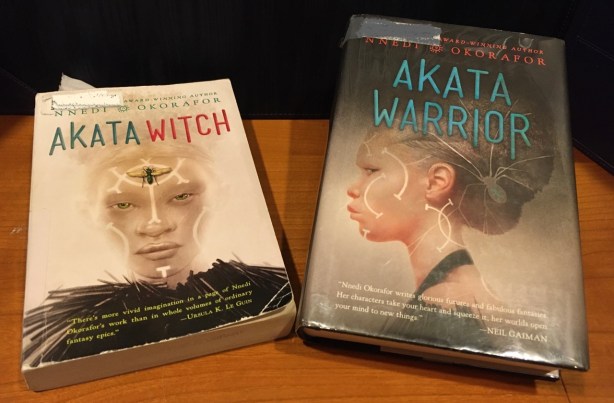
Of course, the bulk of the story involves magical powers and the unseen world. Even if I made it to Nigeria, I doubt I’d encounter most of the creatures or powerful wizards Okorafor brings to life on her pages. As the pandemic has taught me, living through historically exciting events is not always easy or desirable.
Aside from an enjoyable young adult narrative, I appreciate Okorafor’s thoughtful approach to her craft. Regarding her success in a genre whose “great men” were often virulent racists who may well have shunned her, Okorafor wrote on her own blog:
“What I know I want is to face the history of this leg of literature rather than put it aside or bury it. If this is how some of the great minds of speculative fiction felt, then let’s deal with that .…as opposed to never mention it or explain it away.”
I believe this contemplative attitude helps explain why she opted to use a word with heavy connotations in her titles. I use her original titles as opposed to the less racially-charged British ones in an effort to show respect to the author.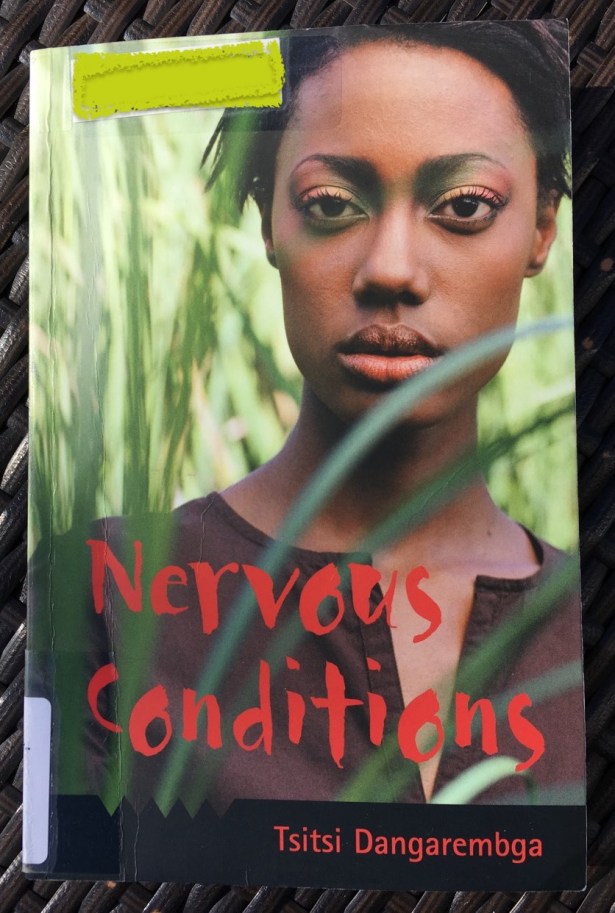
Also set in Africa but half a continent away, I recently dove into Tsitsi Dangarembga’s masterful Nervous Conditions. It takes place in Rhodesia (now Zimbabwe) in the mid-20th Century. I devoured the novel in just a couple of days, perhaps identifying so strongly with its protagonist, Tambudzai, because of her intelligence and drive to get an education against all obstacles.
Tambu reflects upon a new school with: “Most importantly, most wonderfully, there was the library, big, bright, walled in glass on one side and furnished with private little cubicles where you could do your homework, or simply lose yourself…in…books…”
I was a girl just like that.
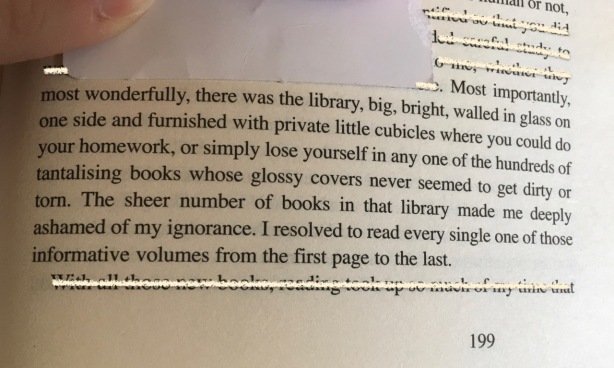
Nervous Condition is the kind of book in which I highlight multiple passages. For the library’s sake, I do that these days by photographing myself pointing to the relevant spot on the page. Less typically for me, I even highlighted some of the author’s comments in the “book club” discussion section at the back of this novel.
Tambu’s story isn’t light or easy. Colonialism, racism, sexism, and poverty all conspire against her success, though she’s quite young when the story begins. She’s complex and complicated, and Dangarembga has drawn her beautifully. Even better, the entire novel is peopled by fully dimensioned, believable characters. Dangarembga writes with a deft hand.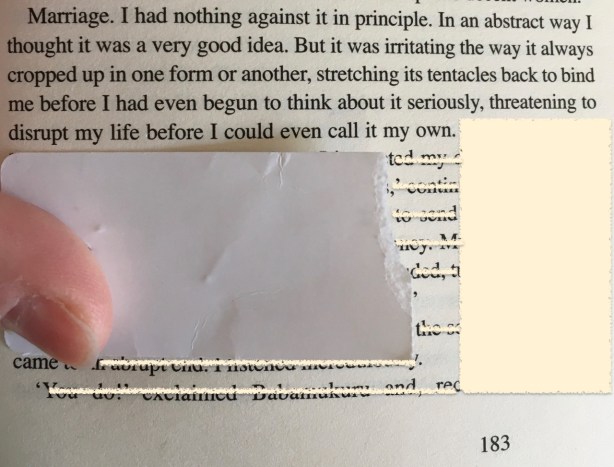
“Marriage. I had nothing against it in principle. In an abstract way I thought it was a very good idea. But it was irritating the way it always cropped up in one form or another, stretching its tentacles back to bind me before I had even begun to think about it seriously, threatening to disrupt my life before I could even call it my own.”
I finished the book quite eager to read its successor, 2006’s The Book of Not. It was unavailable at my local library, though the third volume, 2020’s This Mournable Body could be had. I couldn’t even find book two in our statewide searchable catalog for inter-library loans. Resigning myself to an Amazon purchase, I discovered that a new edition of The Book of Not is due to be released in May of this year. Used copies from 2006 are selling for about $50 each, which is more than I can bear to spend on a paperback. The vagaries of international publishing, perhaps?
I opted to purchase the Audible audiobook version of This Mournable Body—Dangarembga’s only English language audio release, so far as I can tell—because I wanted to directly support the author of a powerful novel that moved me so profoundly.
Also, no lie, it drove me crazy that I still don’t know how to pronounce many names from the story. Unlike European languages and concepts, I struggled to search out definitions for unfamiliar terms, photos of garments about which I was curious, or quick phonetic pronunciation guides. I’m hoping that the audiobook recording will offer me the chance to hear these names spoken by a more educated narrator.
I’ve heard people argue about a lack of rich cultural heritage outside of their narrow conception of the “civilized world;” it’s hard to appreciate what you can’t see because your back is turned!
Segueing not very neatly from far away in distance to far away in time, I must comment on Hugh Howey’s sequel to Wool: Shift. They’re both part of the Silo Saga. These are really good books—if you can tolerate a dystopian future.
My librarian friend The Priestess recommended Wool to me during a weekend away together. I was complaining about how poorly most algorithms do in offering me literary recommendations. I don’t know if that’s true for anyone else, but Amazon and Good Reads do not get me at all. She’d heard good things about it, but not read it herself, I believe.
I enjoyed Wool. It was a fun read, I finished it… then I didn’t think about it again for several years. Somehow, during the pandemic, Shift came to my attention. I think, since Mr. Howey originally self-published via Amazon, that it may have been free to read with Kindle Unlimited. I was definitely hunting that source much more actively than usual in the early shutdown days when I lost weekly library access.
Here’s why I absoluely must mention Shift: I have never before read a sequel and been so much more impressed by it than I was by its precursor. If anything, I’m used to being disappointed by middling follow-ups to novels I loved. That sounds strange, because Wool was a good book. Shift struck me as an even better one, and much more profound.
Consider the Silo Saga if you enjoy Sci Fi and don’t mind reading about the end of the world in the middle of a pandemic disaster.
Myriad mysteries
The string of casual flings I carry on with light murder mysteries continues. Thankfully, our local library opened for pre-ordered, curbside lending after a month or two of darkness, but I have also relied more heavily on the monthly free titles for Amazon Prime members (most of which are mediocre, but they do pass the time) and digital psuedo-purchases, which I loathe on principle.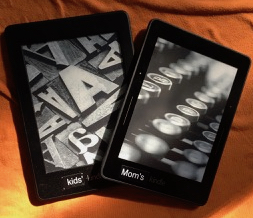
No, if I don’t have a copy of a book or song I can pass to my heirs when I die, I have not purchased it. I’ve rented a license to use my copy during my lifetime. There’s nothing wrong with the model, if it’s what people want, but calling these transactions a purchase strikes me as fraudulent! Stepping down from soapbox…
A Deadly Influence made a pretty fun read, but a single sentence late in the book stopped me cold, prompting me to check the author’s name and confirm that he must be a man. It was a description of an outfit that the protagonist put on to go out and meet a date… and it was so laughably bad, I guessed right that moment that a non-fashionable male had written its description.
The storyline there involves a professional police negotiator, Abby, the calm presence who talks down the guy on the ledge or the hostage holding one with a gun to someone’s head. She (the protagonist) was very believable, except for her dressing up scene, realistically, lightly flawed, yet still likeable. Peeking inside life in a modern cult or two also made this novel stand out from my crowd of similar whodunits. It’s one of the few Amazon freebies I’ve read where I will watch for sequels. I’d like to see Abby’s character develop, and A Deadly Influence ended on a bit of cliffhanger though one I admittedly saw coming, but I didn’t mind.
Better writing through considered consumption of literature
Finally, I can’t leave this post without some discussion of Saunders’ A Swim in the Pond in the Rain. I’m so in love with this book at the moment! Full disclosure: I’m only 4/7 done with it as it was due back to the library and had holds so I couldn’t renew.
George Saunders teaches creative writing at Syracuse. The premise of the book is to explore seven classic works of Russian short fiction, then tease out lessons to improve our own writing from literary greats Chekhov, Turgenev, Tolstoy, and Gogol.
The stories are magnificent. So are Saunders’ essays!
Perhaps the author selected just those few stories which are truly special. More likely, I have failed to read enough of the Russian masters. Technically proficient? Yes. Moving, emotionally rich? Definitely. Yet, somehow, this book is also a great deal of fun. I wish Saunders were my teacher though I’ve already spent far more time in Syracuse than I ever wished to.
I picked this up in order to plan a literature unit for my home educated teen. I thought it would complement the Russian History we’re doing this year. Note to home schoolers: it really, really does! I planned to peruse it, make some notes, then set the child to work on Saunders’ readings and my assignments over the summer term. Instead, I fell into the book myself, only reluctantly returning it on time because I’d foolishly let it sit too long on our library shelf before starting in.
Consider pairing A Swim in the Pond in the Rain with viewing the Great Courses video offering History of Russia: From Peter the Great to Gorbachev taught by Mark Steinberg. Lesson 21: Peasant Life & Culture is particularly apropos, but everything from Lesson 8 (The Decembrist Rebellion) to 25 (War & Revolution) will enhance your appreciation for the context of those stories Saunders offers.
♦
† IMPORTANT NOTE: Please be aware that the unfamiliar word—if you only speak English—in the title, Akata Witch, has derogatory connotations for some Africans and African Americans.
The first book was given a new title for publication in the UK and Nigeria for that reason (What Sunny Saw in the Flames.) My internet research was cursory, of course, since I know no African languages. In spite of many contradictory definitions across the web, my best understanding is that the word is Yoruba—or possibly originated from the Fanti tribe—and is literally defined as an animal (maybe cat or fox.) The emphasis is on an uncivilized creature living outside his/her/its appropriate milieu. I’m not qualified to explain the term beyond this attempt at literal translation.
I wanted to discuss this book, but I hesitated to blindly post a sensitive phrase without this acknowledgement. Read about the term’s slang usage on Urban Dictionary if you’d like to learn more.




